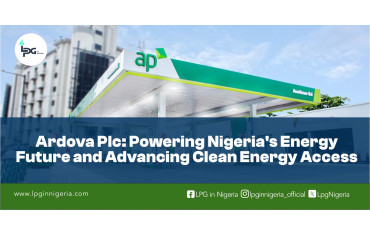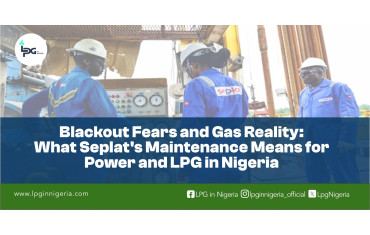- 4511
- 0
Sharing Ideas and Updates on LPG in Nigeria and related information to enable effective collaboration within the LPG Value Chain
LPG Fuel For Powering Greenhouse Farming In Nigeria.

This blog post delves into a topic that currently lacks widespread popularity in Nigeria but is gradually gaining momentum. It aims to cater to our readers seeking additional methods to embrace LPG usage. In recent years, there has been a growing recognition of the need for sustainable agriculture practices in Nigeria to address food security and environmental challenges. Greenhouse farming, as a modern and efficient agricultural method, offers significant potential for increasing crop yields while minimizing resource use and environmental impact.
According to Agri Farming, Nigeria presently boasts approximately 1,000 hectares of greenhouse farmland, predominantly concentrated in the northern regions. Remarkably, greenhouse farming's dominance in tomato production, contributing to nearly 60% of the total output, demonstrates the country's growing inclination towards this agricultural method. Notably, the leading states in greenhouse farming are Kaduna, Kano, Katsina, and Sokoto. Nevertheless, envision the potential for greenhouse farming to flourish in the eastern and western regions of Nigeria as well. Here are some greenhouse farms in Nigeria that also makes use of LPG - Wellshosa Farms, Benin city, Dreamland Farm Resorts, Ikire, and SG Agricultural Farms in Lagos. These farms go to show that it is possible to incorporate LPG into farming while also using methods like hydroponics to make sure better results are achieved.
However, the success of greenhouse farming depends heavily on a reliable and sustainable energy source. Let’s explore the viability of using Liquefied Petroleum Gas (LPG) as an energy source for greenhouse operations in Nigeria, with a focus on promoting sustainable agriculture practices.
Greenhouse Farming and Its Benefits.
Greenhouse farming, also known as protected agriculture, involves growing crops within controlled environments, protected from adverse weather conditions and pests. The greenhouse structure provides a controlled climate, optimizing temperature, humidity, and light levels for enhanced plant growth. Some of the key benefits of greenhouse farming include:
Increased Crop Yield: Greenhouses create optimal growing conditions, leading to higher crop yields compared to open-field farming.
Year-Round Production: By regulating the environment, greenhouse farming enables year-round cultivation, reducing the dependency on seasonal variations.
Resource Efficiency: Greenhouses use water and fertilizers more efficiently, minimizing waste and environmental pollution.
Pest and Disease Control: The controlled environment of greenhouses reduces the risk of pest infestations and diseases, decreasing the need for chemical pesticides.
The Role of Energy in Greenhouse Farming.
Energy plays a vital role in greenhouse farming, as it is required to regulate temperature, provide artificial lighting, and power irrigation systems. Traditionally, greenhouses in Nigeria have been reliant on fossil fuels or grid electricity, both of which come with their challenges. Diesel generators, for instance, are costly to run and contribute to air pollution and greenhouse gas emissions. Grid electricity, on the other hand, is often unreliable and subject to frequent power outages.
LPG as an Energy Source for Greenhouses.
LPG offers a compelling alternative energy source for greenhouse operations, addressing many of the challenges associated with traditional energy options. Here are the reasons why LPG is a viable option:
Clean and Environmentally Friendly: LPG is a clean-burning fuel that emits lower levels of greenhouse gases and harmful pollutants compared to other fossil fuels like diesel and coal. Using LPG in greenhouses contributes to reduced carbon footprint and improved air quality.
Cost-Effective: LPG is often more cost-effective than diesel and can provide significant savings on energy expenses for greenhouse farmers.
Reliable Supply: LPG can be stored onsite, ensuring a consistent energy supply even during power outages or disruptions in the national grid.
Flexible Applications: LPG can power a range of equipment in greenhouses, including heating systems, irrigation pumps, and CO2 generators, supporting the diverse needs of greenhouse farming.
Quick and Easy Installation: LPG systems can be installed relatively quickly, allowing greenhouse farmers to start operations promptly.
Promoting Sustainable Agriculture Practices.
By adopting LPG-powered greenhouses, Nigeria can advance sustainable agriculture practices and address the pressing challenges faced by the agriculture sector. Here are some ways in which LPG-powered greenhouses can promote sustainability:
Reduced Emissions: The lower carbon emissions of LPG contribute to mitigating climate change, aligning with Nigeria's commitments to international climate agreements.
Water Conservation: The controlled environment of greenhouses, along with efficient LPG-powered irrigation systems, enables farmers to use water more efficiently, conserving this valuable resource.
Minimized Chemical Use: With reduced pest and disease pressure in greenhouses, farmers can reduce the reliance on chemical pesticides and herbicides, promoting healthier produce and environmental protection.
Food Security: Greenhouses offer a more stable and consistent crop production, contributing to food security by reducing dependence on weather patterns and seasonal fluctuations.
Rural Employment: The adoption of modern and efficient greenhouse farming can create new job opportunities and drive economic development in rural areas.
Challenges and Solutions.
Despite the advantages, there are challenges in implementing LPG-powered greenhouses in Nigeria:
Initial Investment: The upfront cost of transitioning to LPG-powered greenhouses may be a barrier for some farmers. To address this, the government and private sector could offer financial incentives and grants to support farmers in adopting the technology.
Infrastructure: The availability of LPG distribution infrastructure might be limited in certain regions. Expanding the LPG distribution network and establishing refilling stations in rural areas can improve access.
Safety Measures and Training: Proper training in the safe handling and use of LPG is essential to prevent accidents. The government and industry stakeholders should invest in safety awareness and training programs for greenhouse operators.
LPG-powered greenhouses present an attractive and sustainable option for agricultural development in Nigeria. By providing a controlled environment for crop growth and reducing the environmental impact of greenhouse farming, LPG contributes to more efficient resource utilization and enhanced food security. To ensure a successful transition to LPG-powered greenhouses, collaborative efforts between the government, private sector, and farmers are crucial. Investments in infrastructure, awareness campaigns, and financial incentives will empower Nigerian farmers to embrace this innovative and eco-friendly approach to agriculture, paving the way for a greener and more sustainable future for the nation's agriculture sector.
















0 Comment.